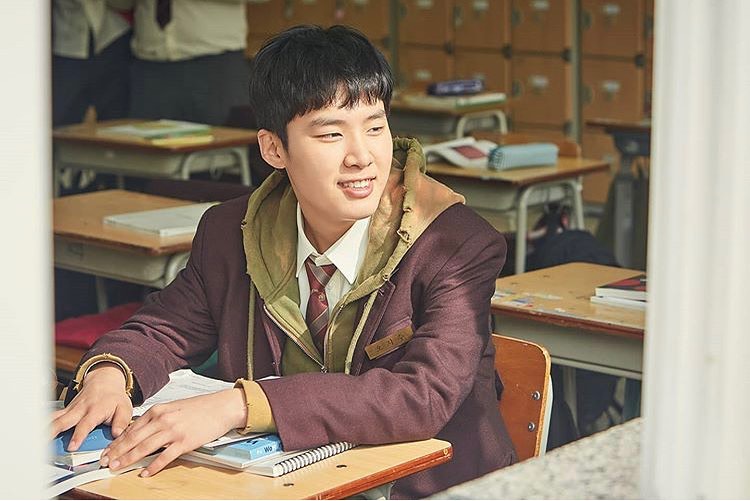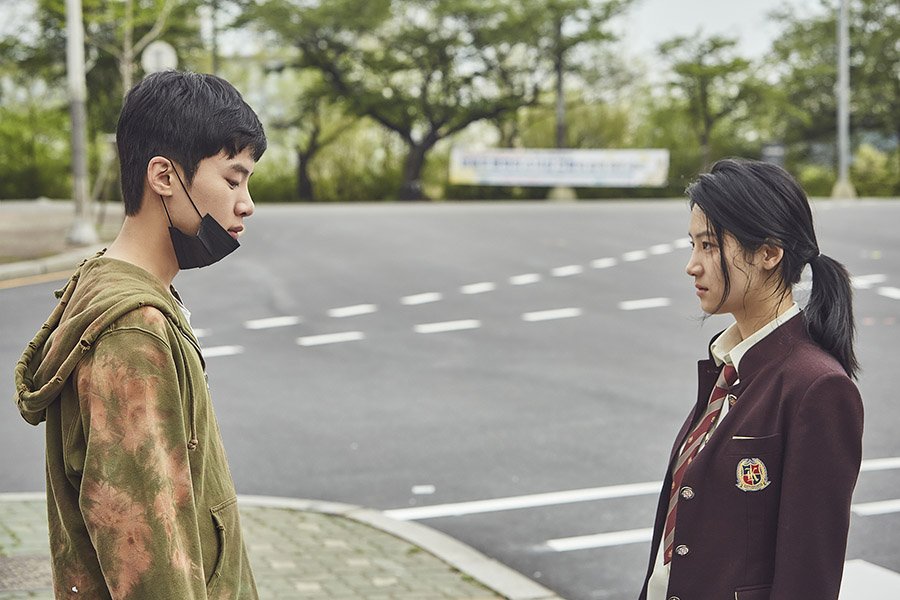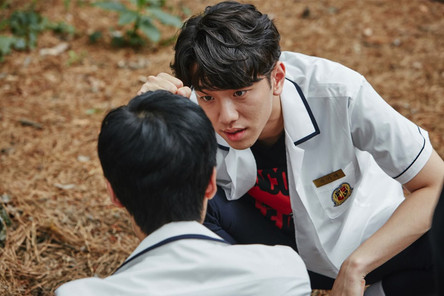Extracurricular: A Non-traditional High School K-Drama (Drama Review)
- Drama Banter

- Aug 23, 2021
- 5 min read
Updated: Oct 29, 2021
I never intended to watch Extracurricular, let alone review it. I did so at the behest of a friend, and I am glad I did. I enjoyed it for being different. I am not a fan of high school K-dramas, but Extracurricular is anything but a typical high school drama. On the contrary, it's dark with an intense take on serious issues from compensated dating, paid protection services, peer and parental bullying, and academic pressures to name a few. Despite its many characters, Extracurricular centers around four teenagers, the main one being the awkward loner Oh Ji Soo (Kim Dong Hee), the headstrong yet selfish female lead Bae Gyu-Ri (Park Joo Hyun), pretty girl Seo Min-Hee (Jung Da Bin), and class bully Kwak Ki Tae (Nam Yoon Su).
At first glance, Ji Soo is a lonely, parentless, timid teenager, and with his perfect grades, he seems on track to attend any of the top three universities in South Korea. But despite his academic achievements, he lacks motivations and views ambition or dreaming of a future as an expensive financial burden, which he hustles to support by secretly managing an illegal protection provider service for a group of teenage girls who participate in compensated dating. It's this stark contrast between the mild-mannered Ji Soo and the hustler that makes Extracurricular an exciting watch.
Unlike Ji Soo, Bae Gyu-Ri (Park Joo Hyun) comes from a wealthy family, bullying her into taking over the family business at such a young age, but also runs her hustle on the side. She comes off as confident and strong-minded, if not crude, but the more one learns of her, the less appealing she becomes, and even more so after she discovers Ji Soo's truth and starts blackmailing him. Despite getting more insight into her less than appealing family life, which I am sure was the catalyst for her subsequent behavior, I couldn't empathize with her, especially for what she does to Ji Soo. She turns his life a living hell. From an organized systematic business in a blink of an eye, everything starts to unravel for letting his guard down and trusting the one person he shouldn't have. The ripple effects of that ensnare not only him, but everybody else involved.
Extracurricular primarily explores the traumas of compensated dating through Min-Hee, who mainly engaged in the service to pay for expensive items and support her boyfriend Ki Tae's gaming habit. But stops participating after a traumatic encounter with an abusive client, which leaves her anxious to continue, but also because she attracts the attention of the police. The drama is exceptional in how it shows the destructive effects of the service itself, but as events unfold, the lack of complete portrayal of the dehumanization that many survivors of trauma experience in Min-Hee made it hard for me to empathize with her or even understand the devastating consequences of a society that treats women and young girls in particular who undergo traumatic sexual encounters as disposable objects.
Beyond compensated dating Extracurricular touches on peer and parent bullying. It mainly showcases peer bullying through Ki Tae, who bullies Ji Soo and others he deems weaker than himself. I felt the show doesn't provide valuable insight into why Ki Tae bullies, since we never get to know him personally. We only observe superficial aspects of him, not what drives him, and as such we don't get a deeper understanding of the significance of bullying, especially in South Korea. The show doesn't really delve much in it, especially the ramifications.
As for parent bullying, we get an aspect of it through Gyu-Ri's parents, who perfectly exemplified the high, and most times unrealistic expectations parents place on their children at an early age in that part of the world. I had a hard time believing they were her birth parents in how deplorably they pimped, for a lack of a better word. In that sense, the drama touches on the consequences of parental bullying in general. It doesn't directly address Gyu-Ri's situation with her parents or the repercussions. On the other hand, the way the show portrays Ji Soo seemed unrealistic -- a teenager without parents or a family who practically raises himself becomes as studious and as focused as Ji Soo -- questionable at best. I found the depiction of him as a parentless teenager who can balance the rigid South Korean educational system while at the same time running a demanding side business without anyone in the system noticing a bit far-fetched. He does so much, but he never gets caught until Gyu-Ri enters his life and makes a massive mess of it.
Still, one of the strongest points of Extracurricular is that it doesn't portray characters as inherently good or evil. All the main characters have moral failings; Ji Soo arranges criminal activity, Gyu-Ri blackmails Ji-soo, Min-hee engages in what Korea considers prostitution, and Ki Tae is a bully. Further, the drama doesn't condemn them for their actions, but instead showcases situations where we as viewers can make our own judgments. Unequivocally, Kim Dong Hee shines as Ji Soo and depicts the character's emotional complexity to the fullest. Park Joo-Hyun performs well as the finicky Gyu-Ri, who constantly switches between an innocent and downright crazy person.
The show is a definite departure from the cliched high school drama genre, and I commend it for the in-your-face method it uses to bring the issue to the forefront, especially the very real dangers of compensated dating. I, for one, didn't know that such a service as compensated dating existed before watching this drama. And to know that older men, or should I say people engage much younger people, sometimes as young as 11 years old for sex, are abhorring. It is difficult to express how terrible it was to know that children, teenagers, and young adults are putting themselves at such a risk for whatever reason and are exploited for it.
Extracurricular starts strong and tackles some serious issues. Still, I felt it lost its focus as it moved further into its development, because it took on too many such issues simultaneously and failed to address them fully in its quest to be different than the cliched high school dramas. That does not take away from the superb performances from the cast, in particular Ji Soo's muscleman Choi Min Soo (Choi Min Soo) and Homeroom teacher Jo Jin Woo (Park Hyuk Kwon). Most importantly, the show paints a vivid picture in its narrative that just because someone appears okay on the outside, it doesn't mean they are on the inside, and pretending otherwise may have detrimental consequences, as clearly depicted in this drama.
























Thank you Drama Banter. 😍 You were pretty fast. In btw. that friend requestor is me. Thanks for watching it and posting the review. 😁 Kim Dong Hee did an amazing job. This drama was too different. Even I had no idea about compensated dating. The way they portrayed all the issues in this drama was spectacular. In the end, it was karma which came after them. Park Joo Hyun and Choi Min Soo also did amazing job. All the actors were great. Not even a single person was innocent in this drama. Usually in kdramas, they keep main actors as the good natured with no selfishness. Even if they are selfish, somehow after few episodes they show a goo…
Interesting overarching analysis of this drama, i watched it when it aired and like you say i did not expect it to turn out the way it did; that is not the first thing that comes to mind from a high school K-drama at all. This is one of the best shows I have watched and seriously pulls you in. Kim Dong-hee really shows another side of him in this show and proves to be an amazing actor. Not only him, but the whole cast truly made this show. From the music to the cinematography, this whole production was top tier. I have seen thousands of shows, ranging from different languages and countries, so by now I have seen ju…